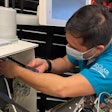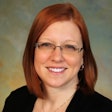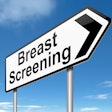Patients who need imaging follow-up but don't get it -- due to health-related social needs obstacles -- require support, according to research presented November 29 at the RSNA meeting.
A team from the University of California, Irvine (UCI) explored the prevalence of financial hardship and other health-related social needs among radiology patients using no-shows and canceled radiology appointment data as the foundation of their study.
“Patients who either cancel or do not show up to their radiology appointments have been shown to have poorer health outcomes,” said presenter Andrew Cuyegkeng. “The purpose of our study was to measure the prevalence of self-reported financial hardship and health-related social needs among those who miss their radiology appointment.”
The team also evaluated factors associated with imaging hardship and nonadherence.
Awareness of patients' hardships
The study consisted of a survey sent to patients via Google between November 2022 and May 2023. Those with no email were called. All were given a $5 gift card for completing the survey. The team received 280 responses with the mean age of participants 55 years old. A majority were women, and about 55% had commercial insurance, 35% had Medicare, and 7% had Medicaid.
In collecting information about health-related social needs, the team divided feedback into three categories:
- Financial worrying, derived by incorporating a validated measure known as Comprehensive Score for Financial Toxicity (COST). The average COST score measuring financial worry was 26.8 on a scale of 0-44 (lower number indicating higher worry). Factors most associated with financial worry were having a chronic condition and living in a disadvantaged area.
- Imaging hardship, gleaned by modifying the 12th question of the COST measure to include a specialty-specific survey point, “My current imaging has been a financial hardship to me and my family.” About 30% said imaging was a financial burden, Cuyegkeng reported.
- Nonadherence and material hardship, for which the Medical Expenditure Panel Survey (MEPS) was used. MEPS is a source of data on the cost and use of healthcare and health insurance coverage. Using MEPS, 35% of those surveyed indicated material hardship, 80% reported care nonadherence with 8% in the area of imaging.
Cuyegkeng and colleagues concluded that financial hardship and HRSNs are common among those who miss their radiology appointments. They also noticed that there is no basic needs screening during radiology encounters.
 Andrew Cuyegkeng and a team of University of California, Irvine (UCI) health equity researchers concluded that financial hardship and health-related social needs are common among those who miss their radiology appointments.
Andrew Cuyegkeng and a team of University of California, Irvine (UCI) health equity researchers concluded that financial hardship and health-related social needs are common among those who miss their radiology appointments.
While the team primarily assessed risk factors on the whole, the group may next examine how systems handle cancellations versus no-shows; the rate of rescheduling and completed exams after follow-ups; and whether they offer weekend appointments.
Regardless, the UCI team recommended rigorous screening for HRSNs and financial hardship and, further, implementing interventions such as transportation, relieving food insecurity, housing stability programs when needed, utility bill assistance programs, financial assistance programs, and better ways to easily understand out-of-pocket costs for the imaging.
Screen for needs during radiology encounters?
In a related presentation, another UCI team investigated the feasibility of screening for health-related social needs for those who do make it to their imaging appointment. Presenter Riya Bansal and colleagues focused on advanced imaging studies such as CT, MRI, and PET-CT performed at UCI's tertiary academic center between November 2022 and March 2023. Here, participants were contacted by phone, email, or approached in person at their radiology encounter to complete a 15-minute survey about experiencing financial hardship.
Using some of the same measures as Cuyegkeng's survey, Bansal's team also asked for participants' views and tolerance for being asked about their financial and social needs at radiology encounters specifically. Like Cuyegkeng's group, a majority of the 430 patients surveyed had commercial insurance or either Medicare or Medicaid.
"A majority of the patients find screening appropriate at radiology encounters -- at close to 80%," Bansal said. "It is important to note that only 9.9% of participants receive screenings at encounters apart from UCI, highlighting that we are not screening routinely, and other services may also have limited screening. It is also important to note that close to 30% of patients were interested in meeting with an institutional financial counselor."
Additionally, Bansal's team ran a multivariable analysis to understand what factors were associated with the appropriateness and comfort of screening at radiology encounters and meeting with a financial counselor in the related setting. Their results showed that those who were older were less likely to find screening appropriate; however, those indicating imaging hardship were more likely to find screening appropriate.
They predicted that those uncomfortable with screening (16.6%) feared that disclosing their needs may result in receiving suboptimal care.
Trends in canceled radiology appointments, no-shows
Finally, in a third related presentation, Arham Aijaz and colleagues looked at 79,167 advanced imaging exams at an affiliate outpatient imaging center, hoping to spot trends in missed radiology appointments. This team looked at common social factors that increase the likelihood of radiology cancellations, such as work, family emergency, finances, wait time, transportation, and other factors. In addition, they incorporated the area deprivation index (ADI) and Neighborhood Atlas developed by the University of Wisconsin-Madison.
Aijaz et al evaluated the prevalence of cancellations versus no-shows in the outpatient radiology setting. Out of the 79,167 exams reviewed systematically for one year starting January 1, 2022, about one-fifth were canceled, and the percentage of no-shows was 2%. The mean age of those with a scheduled exam was 60, plus or minus 15.5 years. Further, a majority of the reasons behind cancellations were uncategorized personal reasons (56.89%); only 2.39% were attributed to financial hardship.
The researchers found that PET-CTs were the most canceled or missed appointments (42.4%), followed by mammography (26.9%), MRIs (22.3%), and CTs (21.4%). Of those missed, 70.19% were patient-initiated, 11.03 were imaging center-initiated, and 18.68% were provider-initiated.
While this study had several limitations, the findings may inspire practice administrators to analyze missing versus eventually completed appointments for PET-CTs, mammography, MRIs, and CTs, as well as detect patterns from multiple cancellations and no-shows that could lead to operational improvements or better patient engagement.




















